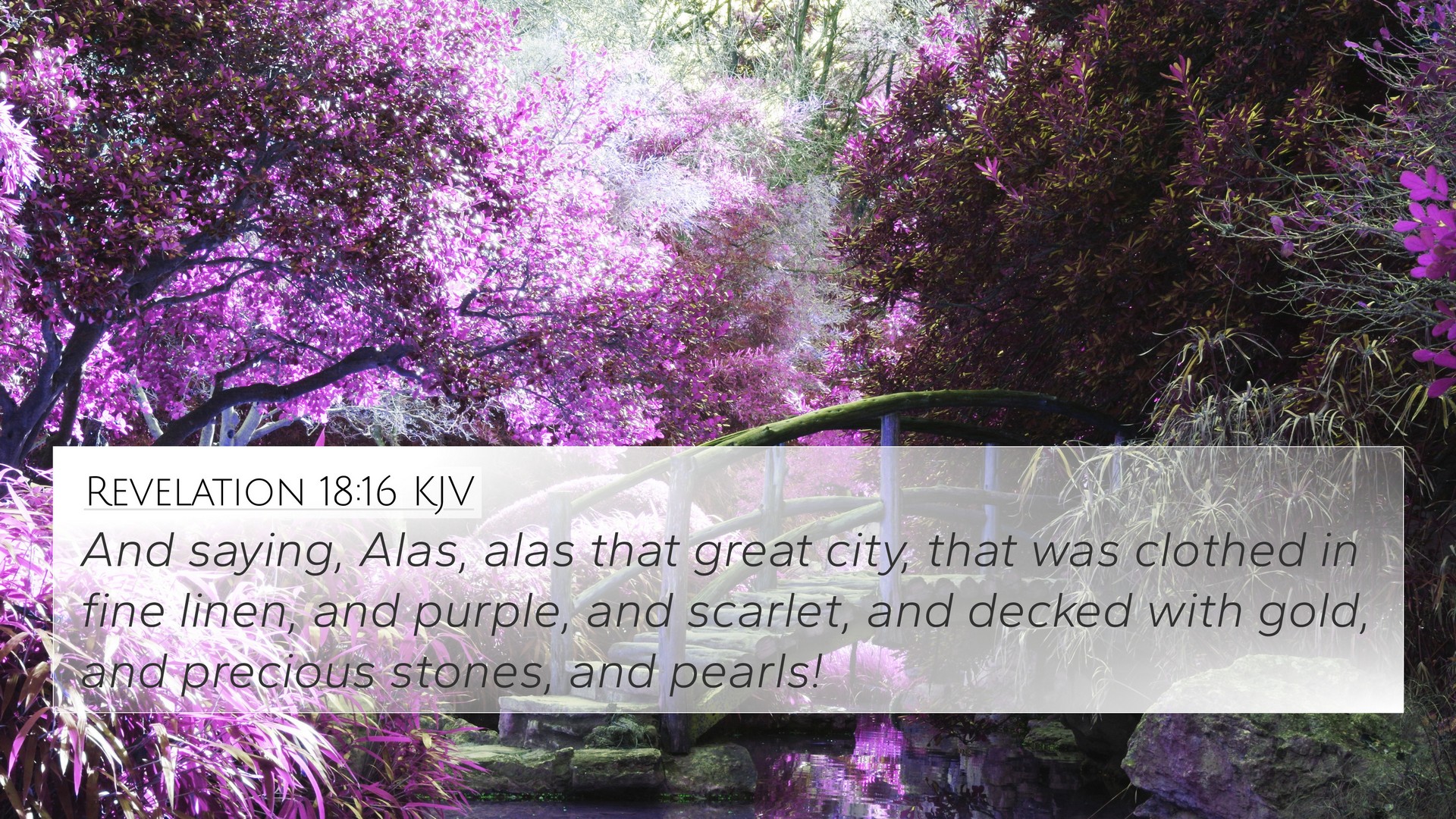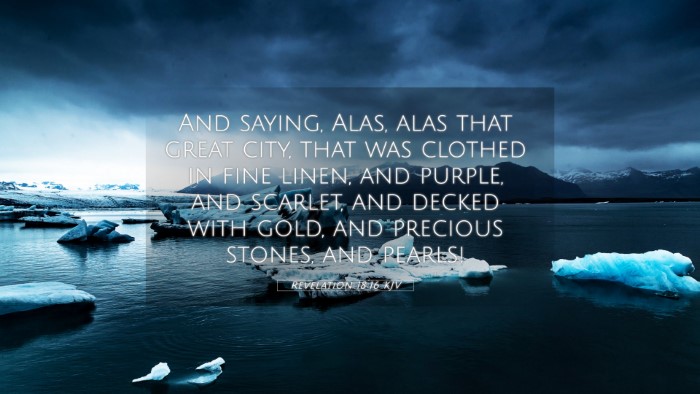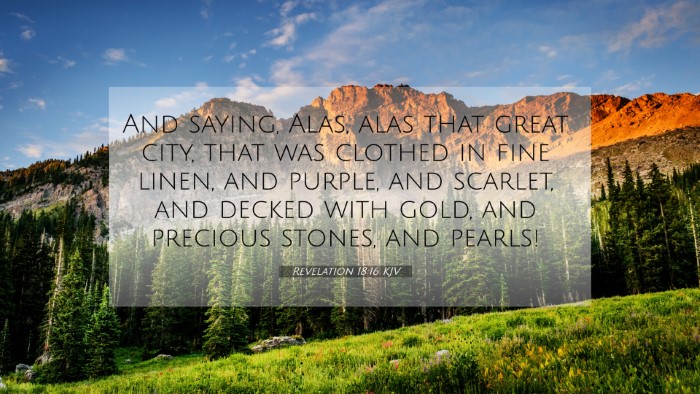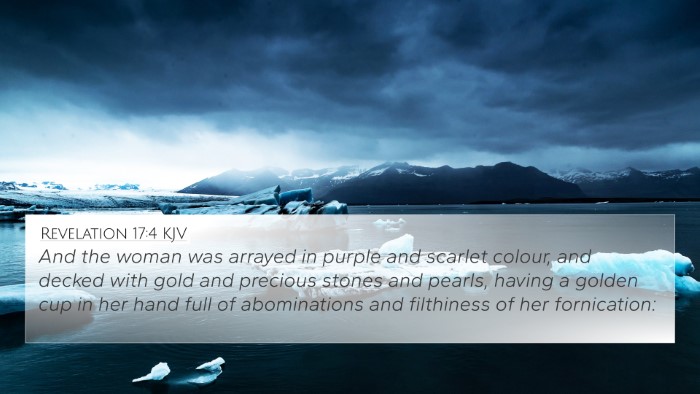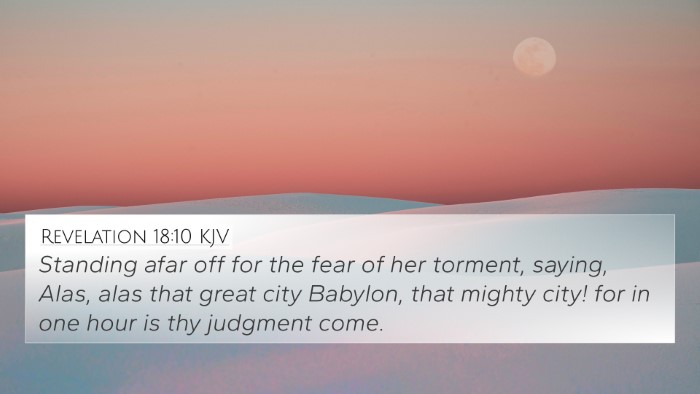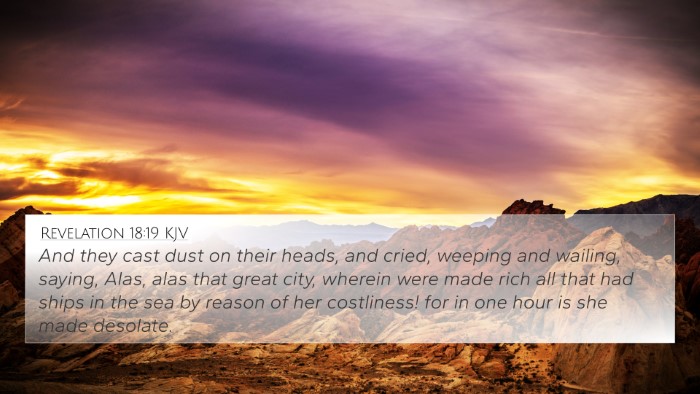Understanding Revelation 18:16
Revelation 18:16 states: “And saying, Alas, alas! that great city that was clothed in fine linen, and purple, and scarlet, and decked with gold, and precious stones, and pearls!” This verse culminates the vivid portrayal of Babylon’s fall, a representation of the opulence and corruption that led to divine judgment.
Overview of the Verse
This lament over the great city symbolizes the ultimate destruction of a system based on materialism, luxury, and immorality. The vivid imagery of fine linen, purple, and gold showcases the depth of its blasphemy and idolatry.
Commentary Insights
-
Matthew Henry's Commentary
Matthew Henry emphasizes the sorrowful lament of those who once benefited from the city’s prosperity. He notes that the language reflects a deep mourning for the loss of worldly riches and pleasures, denoting the inevitable downfall of prideful societies.
-
Albert Barnes' Notes on the Bible
Barnes connects this passage with the broader themes of judgment against oppressive cities throughout Scripture. He points out that the garments mentioned (fine linen, purple, and scarlet) are frequently associated with wealth and indulgence, indicating that the city was revered for its external splendor, which ultimately could not shield it from God’s wrath.
-
Adam Clarke's Commentary
Clarke elaborates on the symbolic nature of the “great city,” which represents not only a physical location but also the spirit of rebellion against God. This verse serves as a caution against the dangers of idolatry and materialism, highlighting how fleeting such worldly gains can be when faced with divine judgment.
Bible Verse Cross-References
- Revelation 17:4: Describes the woman, representing Babylon, adorned with similar luxurious items.
- Isaiah 47:8-9: Paints a picture of the fall of Babylon due to its pride and sorcery.
- Jeremiah 51:8: Speaks of Babylon’s sudden destruction and the lament that follows.
- Ezekiel 27:24: Accounts for the merchants of Tyre, paralleling the wealth and trade that characterized Babylon.
- 1 Timothy 6:9-10: Warns against the desire for wealth, which leads to ruin and destruction.
- Matthew 6:19-21: Instructs believers to store up treasures in heaven, contrasting with Babylon’s earthly riches.
- Revelation 14:8: Declares the fall of Babylon, setting the stage for the lamentation in Revelation 18.
- Proverbs 23:4-5: Advises against laboring for wealth, echoing the futility of Babylon's pursuits.
- Luke 16:19-31: Throughout the parable of the rich man and Lazarus, a parallel can be drawn to the consequences of worldly indulgence.
- James 5:1-3: A condemnation of the rich, reminding readers of the transient nature of wealth.
Thematic Connections
The verse symbolizes various thematic Bible verse connections concerning pride, materialism, and the transient nature of earthly glory. Through cross-referencing Biblical texts, one can uncover a collective biblical narrative warning against misplacing trust in worldly wealth.
Cross-Referencing the Themes
In drawing comparative Bible verse analysis, the message of Revelation 18:16 is echoed throughout scripture, emphasizing a consistent theme from both the Old and New Testaments. For instance, the condemnation of pride in Proverbs and the ultimate warning in 1 Timothy come together to reinforce the message against reliance on material possessions.
Practical Applications
Using tools for Bible cross-referencing, believers can study these themes extensively:
-
Bible concordance: Helps find themes on wealth and its consequences across the scriptures.
-
Bible cross-reference guide: Facilitates deeper studies into how verses interlink.
-
Cross-reference Bible study: Strategies for understanding interconnected biblical concepts.
-
How to use Bible cross-references: Methods for engaging with scripture through comparative study.
-
Cross-referencing Bible study methods: Techniques to analyze scripture collectively for greater insight.
-
Bible reference resources: A variety of tools available to aid in thematic exploration.
Conclusion
Revelation 18:16 serves not merely as a lament but as a profound reminder of the spiritual dangers posed by materialism. By understanding its connections through inter-Biblical dialogue, believers can glean wisdom applicable to contemporary life, always aware of the fleeting nature of earthly possessions.
